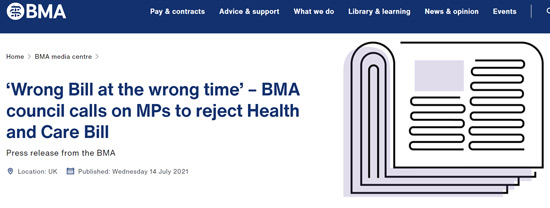BMA council has overwhelmingly passed a resolution calling for the Health and Care Bill to be rejected, arguing that it is the wrong time to be reorganising the NHS, fails to address chronic workforce shortages or to protect the NHS from further outsourcing and encroachment of large corporate companies in healthcare, and significantly dilutes public accountability.
The BMA is also concerned about the wide-ranging excessive powers the Bill would confer on the Health Secretary.
The Association believes the Bill carries significant risks and fails to address the problems the NHS is currently facing. Implementing wholesale reform while the country and NHS is still fighting Covid-19 is especially unwise when we consider the extensive backlog of care the NHS is facing and how little time doctors have had to discuss and scrutinise the details. Despite its title, the Bill does nothing to address the serious failings in social care that needs urgent attention.

Without significant amendment, the BMA will indicate that it cannot support the Bill. Parliamentary amendments the Association will be calling for include making sure there are genuine and transparent protections against privatisation, embedding clinical leadership throughout Integrated Care Systems (ICSs), addressing the ‘power grab’ by the Secretary of State and ensuring political responsibility for staffing levels.
Dr David Wrigley, deputy chair of BMA council, said:
“This is not the right time to be making such widespread changes to our health service. What’s more the Bill addresses none of the problems the NHS is currently facing - too few resources, too little funding, a crisis in social care and a huge shortage of staff. It does not address the problem of a workforce that is exhausted and depleted by the pandemic and is now facing yet another wave."
He continued:
“Healthcare workers have led from the front throughout this pandemic, but the Bill in its current form undercuts truly representative clinical leadership. The BMA has consistently called for meaningful clinical leadership, engagement and representation at every level of Integrated Care Systems, including from primary and secondary care as well as public health doctors to ensure the right voices are heard when it comes to commissioning decisions, but this has not been adequately addressed in the legislation. The threat of private health providers having a formal seat on new decision making boards, and wielding influence over commissioning decisions, must be ruled out."
The Bill extends control by politicians and in partgicularly that of the Secretary of State for Health & Social Care:
“What should also have been ruled out is extending the powers of the Health Secretary. Of course, the Health Secretary should be accountable for the NHS, but it would be totally wrong for Government to have the power to abolish arm’s length bodies without due scrutiny, approve or reject ICS chairs, or interfere with local decisions – all of which risk political interference for political gain, and do not have the interests of the NHS, or its patients, at heart."
On the rmoval of enforced competition, Dr Wigley said this:
“The BMA has long supported collaboration and called for the removal of enforced competition through Section 75,
which the Bill would achieve. The most effective way of doing that is to make the NHS the default option for NHS contracts and to only tender competitively where this is not possible. This is also vital to avoid the awarding of contracts without scrutiny to private providers at huge expense to the taxpayer, as was seen with the procurement of PPE and Test and Trace during the pandemic."
On the current Bill he said:
“Fundamentally, the legislation is a missed opportunity to truly boost the NHS workforce. We entered the pandemic on the backfoot, with a historic workforce crisis that has only worsened over the last year. This Bill does nothing to address the huge staffing shortages facing the health service. The NHS is the people who work in it, and having a fully-fledged workforce is vital to safe patient care, which is why Government must be accountable for ensuring adequate numbers of staff. The Bill must include a responsibility for the Secretary of State to produce ongoing accurate and transparent workforce assessments which will directly inform recruitment needs, now and in the future."
Commenting on the previous Tory Government interference with the NHS, he said:
“We don’t want Government to stick with the status quo but it has unfortunately not learned lessons from the failures of the 2012 Lansley Health and Social Care Act. It could have restored a collaborative NHS, properly funded and staffed, publicly delivered and publicly accountable but it has failed to do so. Instead we have the wrong Bill at the wrong time.”